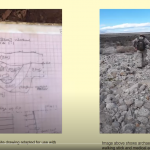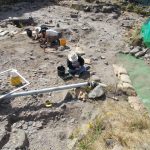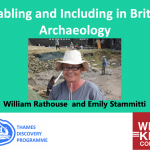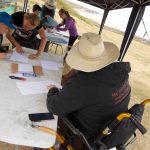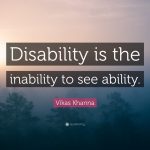Disability Inclusion in Archaeology
By Sophia Caci
June 2024
Since the development of modern archaeology in the 19th century, the field has changed and developed significantly, adapting and shifting to accommodate the changing landscape and the people who live on it. A major part of this change in Britain saw its beginning in the 1970s when ideas on how to incorporate larger groups of people into archaeological fieldwork appeared. Read More >>
Disability Inclusion in Archaeology
By Sophia Caci
June 2024
Since the development of modern archaeology in the 19th century, the field has changed and developed significantly, adapting and shifting to accommodate the changing landscape and the people who live on it. A major part of this change in Britain saw its beginning in the 1970s when ideas on how to incorporate larger groups of people into archaeological fieldwork appeared. Read More >>
Disability Inclusion in Archaeology
By Sophia Caci
June 2024
Since the development of modern archaeology in the 19th century, the field has changed and developed significantly, adapting and shifting to accommodate the changing landscape and the people who live on it. A major part of this change in Britain saw its beginning in the 1970s when ideas on how to incorporate larger groups of people into archaeological fieldwork appeared. Read More >>
Disability Inclusion in Archaeology
By Sophia Caci
June 2024
Since the development of modern archaeology in the 19th century, the field has changed and developed significantly, adapting and shifting to accommodate the changing landscape and the people who live on it. A major part of this change in Britain saw its beginning in the 1970s when ideas on how to incorporate larger groups of people into archaeological fieldwork appeared. Read More >>
Disability Inclusion in Archaeology
By Sophia Caci
June 2024
Since the development of modern archaeology in the 19th century, the field has changed and developed significantly, adapting and shifting to accommodate the changing landscape and the people who live on it. A major part of this change in Britain saw its beginning in the 1970s when ideas on how to incorporate larger groups of people into archaeological fieldwork appeared. Read More >>
Disability Inclusion in Archaeology
By Sophia Caci
June 2024
Since the development of modern archaeology in the 19th century, the field has changed and developed significantly, adapting and shifting to accommodate the changing landscape and the people who live on it. A major part of this change in Britain saw its beginning in the 1970s when ideas on how to incorporate larger groups of people into archaeological fieldwork appeared. Read More >>
Disability Inclusion in Archaeology
By Sophia Caci
June 2024
Since the development of modern archaeology in the 19th century, the field has changed and developed significantly, adapting and shifting to accommodate the changing landscape and the people who live on it. A major part of this change in Britain saw its beginning in the 1970s when ideas on how to incorporate larger groups of people into archaeological fieldwork appeared. Read More >>
Disability Inclusion in Archaeology
By Sophia Caci
June 2024
Since the development of modern archaeology in the 19th century, the field has changed and developed significantly, adapting and shifting to accommodate the changing landscape and the people who live on it. A major part of this change in Britain saw its beginning in the 1970s when ideas on how to incorporate larger groups of people into archaeological fieldwork appeared. Read More >>
Disability Inclusion in Archaeology
By Sophia Caci
June 2024
Since the development of modern archaeology in the 19th century, the field has changed and developed significantly, adapting and shifting to accommodate the changing landscape and the people who live on it. A major part of this change in Britain saw its beginning in the 1970s when ideas on how to incorporate larger groups of people into archaeological fieldwork appeared. Read More >>
Disability Inclusion in Archaeology
By Sophia Caci
June 2024
Since the development of modern archaeology in the 19th century, the field has changed and developed significantly, adapting and shifting to accommodate the changing landscape and the people who live on it. A major part of this change in Britain saw its beginning in the 1970s when ideas on how to incorporate larger groups of people into archaeological fieldwork appeared. Read More >>
